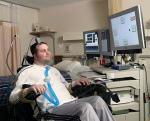by
Michael Johns, Project Manager | July 14, 2006

Matt Nagle, paralyzed
from the shoulders down
is 1st to test "Brain Gate"
As reported on Philly.com.
With the aid of electrodes implanted in his brain, a man paralyzed from the neck down was able to perform certain everyday activities - move a computer cursor, open e-mail, turn on a TV set - merely by imagining them.
The patient, whose spinal cord was injured when an attacker stabbed him in the neck, was even able to open and close a prosthetic hand, his thoughts translated into action by a computer system developed at Brown University.



Ad Statistics
Times Displayed: 563
Times Visited: 3 Keep biomedical devices ready to go, so care teams can be ready to care for patients. GE HealthCare’s ReadySee™ helps overcome frustrations due to lack of network and device visibility, manual troubleshooting, and downtime.
The results, reported in today's issue of the journal Nature, offer hope that thousands of people with injured spinal cords could someday regain significant function by simply bypassing the injury. Authors predicted a commercial version of the system would be available in just a few years and would also work for victims of stroke and amyotrophic lateral sclerosis, commonly called Lou Gehrig's disease.
For now, patients must be tethered to a cart loaded with electronics, connected by a cable that plugs into the skull. Eventually the Brown team wants to implant wireless devices and program them so a patient could activate not just computer cursors or prosthetic devices, but his own hands and arms.
Coincidentally yesterday, a team that includes Drexel University scientists reported progress toward a similar goal in lab rats, albeit by different means. The researchers removed a nerve from each animal's leg and transplanted it across the injured spinal cord, restoring some mobility to paralyzed forelimbs.
The efforts of the Brown team, which worked with researchers in Chicago and Massachusetts, seem like something out of science fiction.
After implanting electrodes in the brain of Matthew Nagle, the 26-year-old stabbing victim from Weymouth, Mass., scientists discovered that the neurons associated with moving his arms and hands could still generate electrical signals - a surprising find three years after the attack.
They ran wires through his skull to BrainGate, an electronic device that filtered out noise and learned to interpret the signals. When connected to a computer, Nagle was able to play the video game Pong and also drew a circle using a computer drawing program.
"I just imagined moving the cursor," he said in a telephone interview from his room in a Massachusetts rehab hospital.
University of Pittsburgh neurobiologist Andrew Schwartz, who was not part of this study but who has done similar work in monkeys, said the success in human patients was a good start.
It is "still far from being a useful device," he wrote in an e-mail from Europe, where he was traveling.

